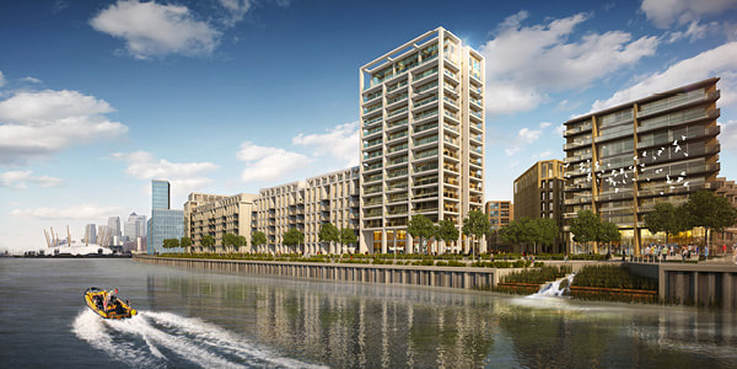Chinese President Xi Jinping's mantra that homes should be for living in is falling on deaf ears, with tens of millions of apartments and houses standing empty across the country. Soon-to-be-published research will show that roughly 22 per cent of China's urban housing stock is unoccupied, according to Gan Li, an academic who ran the main nationwide study. That adds up to more than 50 million empty homes, he said. The nightmare scenario for policy makers is that owners of unoccupied dwellings rush to sell if cracks start appearing in the property market, causing prices to spiral. The latest data, from a survey in 2017, also suggests Beijing's efforts to curb property speculation - considered by leaders a key threat to financial and social stability - are coming up short.
Smaller China cities help lift prices of new homes
Prices of China's new homes accelerated last month, led by gains in smaller cities, suggesting a key driver of the country's economic growth remained intact despite slower investment and increasing economic headwinds. Average new-home prices in China's 70 major cities rose 1 per cent in October from a month earlier, a touch higher than the previous month's reading of 0.9 per cent, according to Reuters calculations based on an official survey. While solid growth in the sector could cushion the impact of a vigorous multi-year government crackdown on debt and escalating trade tensions with the United States, it could also stoke fears of a bubble if prices climb too quickly. China's property market has been relatively resilient, despite tighter property curbs, as many investors exploited regulatory loopholes and turned to smaller cities facing fewer restrictions. China's four biggest cities - Beijing, Shanghai, Shenzhen and Guangzhou - posted no change in their average monthly prices. However, signs of a slowdown in the property sector - a key driver of gross domestic product - are emerging, with growth in China's real estate investment in October cooling to a 10-month low and home sales falling again, as developers held back expansion plans in the face of broadly softening economic conditions.
A potent combination of nervous buyers, cautious lenders and retreating investors has turned Australia's once booming housing market to dust. With the downturn now in its second year, the question for home-owners, house-hunters and property investors is how much further there is to go. Prices in Sydney, the epicentre of the preceding boom, are falling at an annualised pace of about 8 per cent. The optimistic view is that with employment still growing, the declines will stay orderly and help return some affordability to a stretched housing market. As prices decline, fear of missing out has turned to fear of paying too much.
HK property prices - it's all down to location, size
Hong Kong's notoriously unaffordable property prices have started to turn down. In thinking about how bad the reversal may get, four words offer a useful guide - location, location, location, and size. The real estate broker's mantra holds as true for the Chinese city as for housing markets anywhere - prices of homes in the most central districts will be more resilient than those in the suburbs. The distinguishing feature of Hong Kong is the premium on space. In a city where rising prices have encouraged developers to build ever tinier apartments, the relative undersupply of larger properties should ensure they hold up better in a slump. Hong Kong property prices rose more than fivefold between 2003 and the middle of this year, and the city is frequently ranked as the world's least affordable market in global surveys. A sagging stock market is also taking a toll on buyers' confidence in Hong Kong, while the trade war will pressure an already slowing Chinese economy. That could impact Hong Kong's unemployment rate, which at 2.8 per cent at the end of September was the lowest since before the Asian financial crisis in 1997. To top it off, the influx of mainland Chinese buyers who helped to power the boom has slowed to a trickle.
Demand for new office space in London will continue even with the imminent exit of the UK from the European Union (EU), a closely-watched industry survey showed on Tuesday, with technology, media and telecom companies taking up most spaces in the city. The London office market remains resilient despite the slow pace of Brexit negotiations and growing speculation about a no-deal weighing heavily on business sentiment, the London Office Crane Survey by Deloitte Real Estate showed. Britain is due to leave the EU in March 2019, with the BBC reporting that the EU and Britain agreed to a draft Brexit divorce deal text on Tuesday. The survey showed that office take-up in central London was 6 per cent higher in the third quarter than a year earlier as businesses shrugged off Brexit uncertainty. Some of the biggest central London property deals in Q3 were Facebook renting three buildings in the King's Cross Central development and Publicis Group take-up of space at White City Place.
Asean meetings to take stock, boost regional cooperation
Singapore will be in the spotlight this week as leaders of all 10 Asean members gather for the 33rd Asean Summit and several related meetings at the Suntec Singapore convention centre. The summit, which mark the final milestone of Singapore's chairmanship of Asean this time round, will be chaired by Prime Minister Lee Hsien Loong. The leaders are expected to adopt the Asean Smart Cities Framework, the Prime Minister's Office (PMO) said in a statement. The framework covers the setting up of a network of smart cities in the region. Its initial 26 members include Bangkok, Cebu City and Yangon, all of which will tap technology and work with partners to improve public services and economic opportunities for residents, among others. The leaders will also take stock of Asean's achievements this year in strengthening the grouping's resilience and innovation - two key themes of Singapore's chairmanship - and discuss how to take Asean forward at a time of geopolitical and economic change.
Vietnam becomes 7th country to ratify Trans-Pacific trade deal
Vietnam's lawmaking body, the National Assembly, unanimously ratified a landmark 11-country deal that will slash tariffs across much of the Asia-Pacific. One of the region's fastest-growing economies, its status cemented by strong exports and robust foreign investment, the South-east Asian nation is believed to be among the largest beneficiaries of the trade deal. The ratification makes Vietnam the seventh country to have passed the Comprehensive and Progressive Agreement for Trans-Pacific Partnership (CPTPP), the National Assembly said in a statement.






 RSS Feed
RSS Feed
